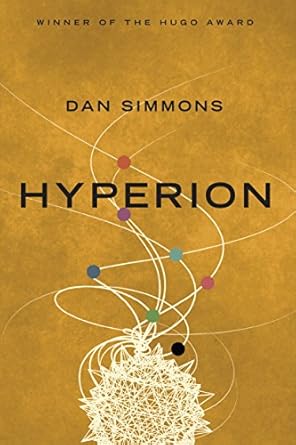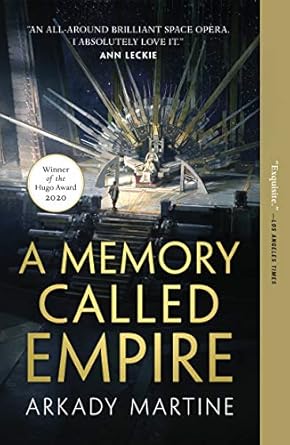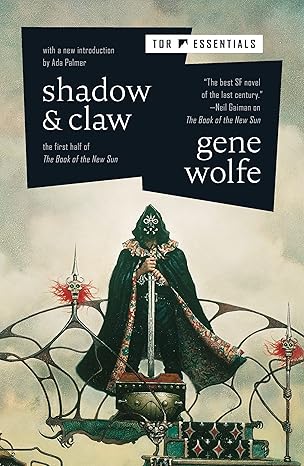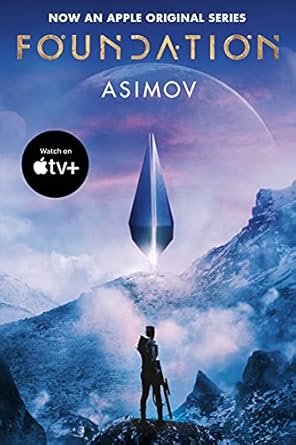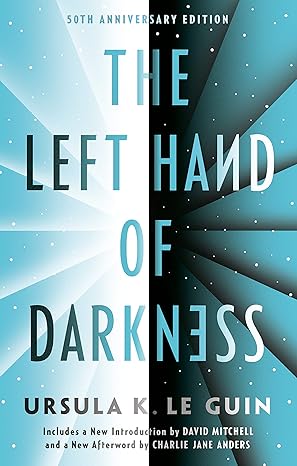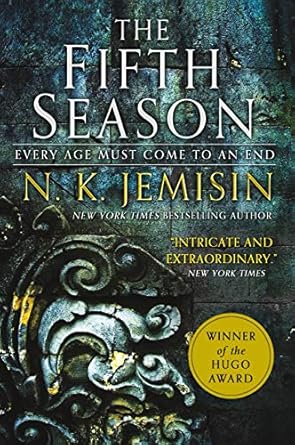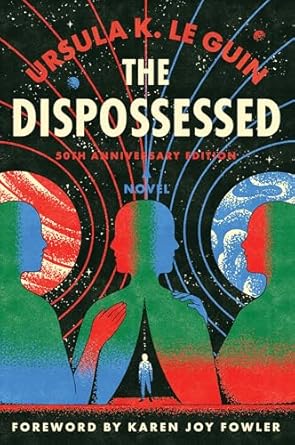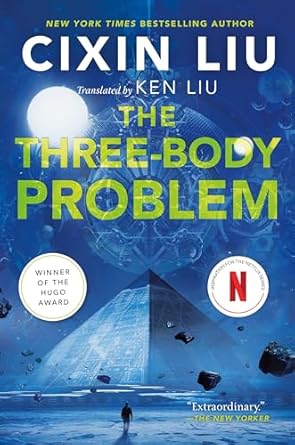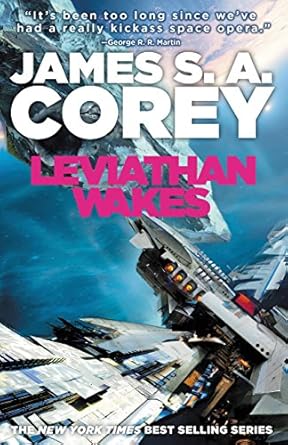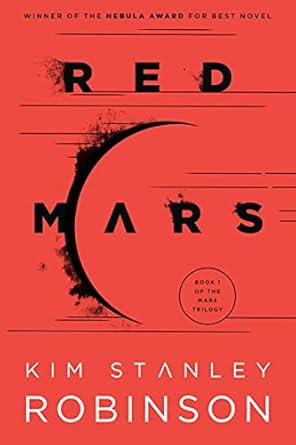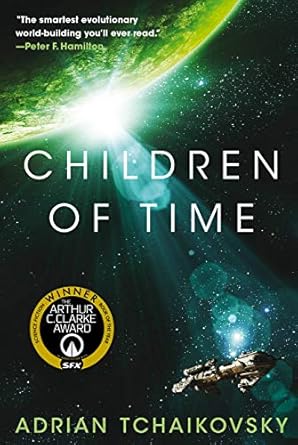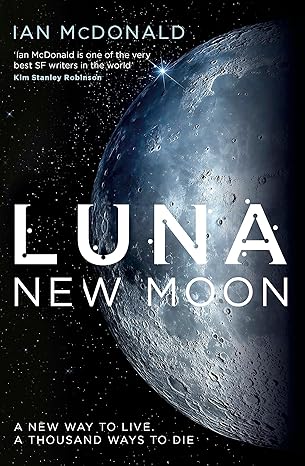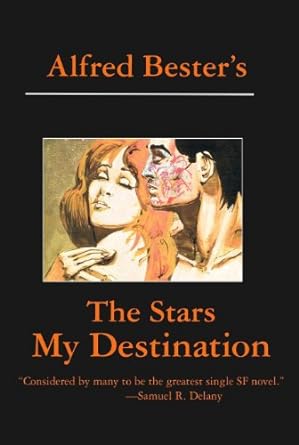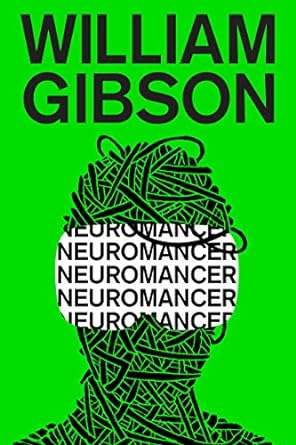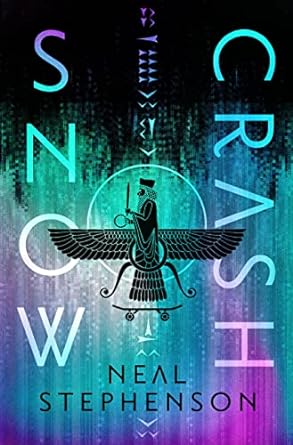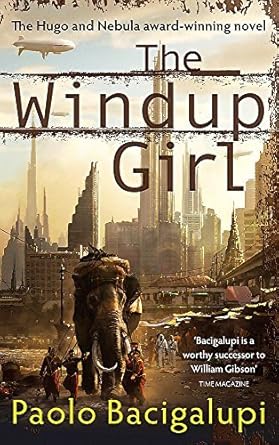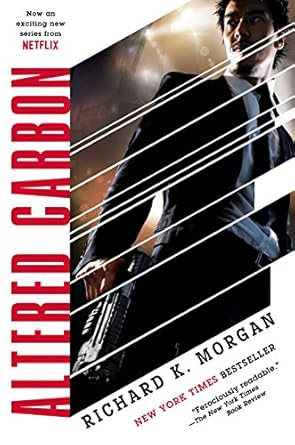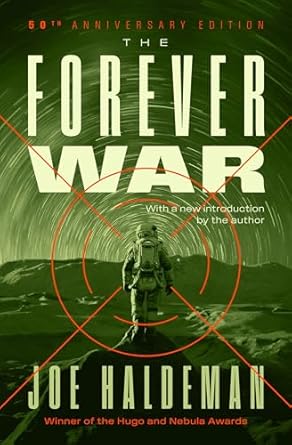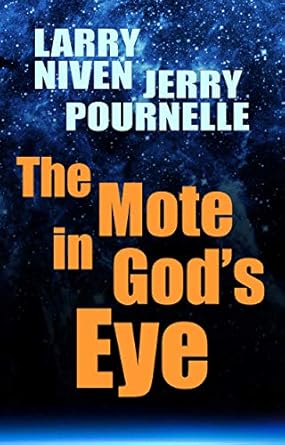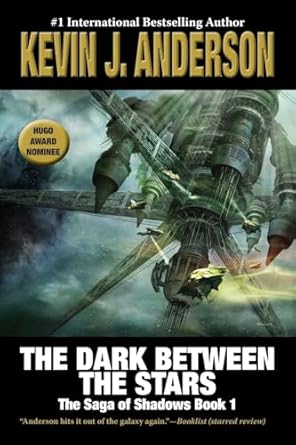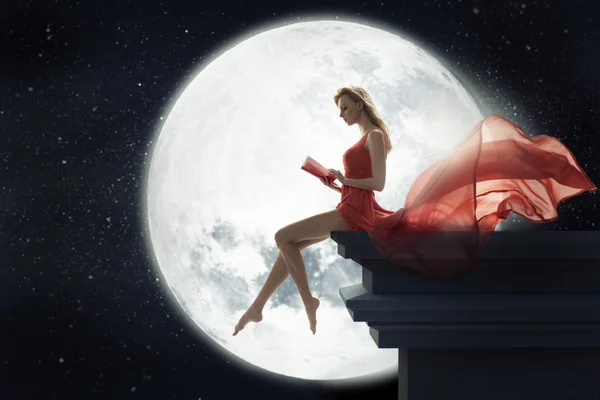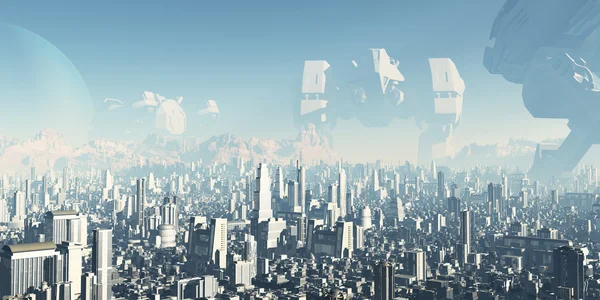Summary: In this article, I have compiled 20 of the best books similar to Dune that explore deep philosophical themes and rich, immersive universes. Here are my top 3:
- Hyperion by Dan Simmons
- A Memory Called Empire by Arkady Martine
- The Book of the New Sun by Gene Wolfe
If you love Dune, you’ll probably enjoy other epic sci-fi novels with rich world-building, complex politics, and thought-provoking themes. These books dive into power struggles, human nature, and the impact of technology, much like Dune. They offer an immersive experience that blends deep ideas with expansive storytelling, taking you to incredible, imagined worlds. Perfect for readers who crave a sci-fi adventure that challenges both the mind and imagination.
TOP 20: Best Books Similar to Dune
- Hyperion by Dan Simmons
- A Memory Called Empire by Arkady Martine
- The Book of the New Sun by Gene Wolfe
- Foundation by Isaac Asimov
- The Left Hand of Darkness by Ursula K. Le Guin
- The Fifth Season by N.K. Jemisin
- The Dispossessed by Ursula K. Le Guin
- The Three-Body Problem by Liu Cixin
- Leviathan Wakes by James S.A. Corey
- Red Mars by Kim Stanley Robinson
- Children of Time by Adrian Tchaikovsky
- Luna: New Moon by Ian McDonald
- The Stars My Destination by Alfred Bester
- Neuromancer by William Gibson
- Snow Crash by Neal Stephenson
- The Windup Girl by Paolo Bacigalupi
- Altered Carbon by Richard K. Morgan
- The Forever War by Joe Haldeman
- The Mote in God’s Eye by Larry Niven and Jerry Pournelle
- The Dark Between the Stars by Kevin J. Anderson
1. Hyperion
- Author: Dan Simmons
- About: A group of seven pilgrims embarks on a journey to Hyperion, each recounting their unique story as they approach the mysterious Time Tombs guarded by the Shrike.
- Style of writing: Frame narrative reminiscent of The Canterbury Tales, blending genres like horror, romance, and mystery.
- Length: Approximately 167,000 words.
- Year written: 1989
- Emotional impact: Profound and thought-provoking; it lingers long after the final page.
- Difficulty level: Moderate to high due to its intricate structure and layered references.
- Why read it: For its masterful storytelling and deep exploration of human destiny and the unknown.
2. A Memory Called Empire
- Author: Arkady Martine
- About: Ambassador Mahit Dzmare navigates the political labyrinth of the Teixcalaanli Empire while uncovering the mystery behind her predecessor’s death.
- Style of writing: Rich, intricate prose with a focus on political intrigue, cultural assimilation, and language.
- Length: Approximately 130,000 words.
- Year written: 2019
- Emotional impact: Engaging and intellectually stimulating, provoking thoughts on identity and imperial power.
- Difficulty level: Moderate, given its complex political and cultural dynamics.
- Why read it: For its fresh take on empire and diplomacy that resonates with fans of deep, layered sci‑fi.
3. The Book of the New Sun
- Author: Gene Wolfe
- About: Follows Severian, a former torturer exiled for an act of mercy, on a journey through a far-future Earth filled with enigmatic societies and mystical elements.
- Style of writing: Dense, layered, and allegorical with a mix of archaic and futuristic language.
- Length: Roughly 330,000 words across its four volumes.
- Year written: 1980–1983
- Emotional impact: Deeply enigmatic and memorable, challenging readers to unravel its rich symbolism.
- Difficulty level: High, due to its complex prose and non-linear narrative.
- Why read it: For an immersive, intellectual experience that rewards careful reading and reflection.
4. Foundation
- Author: Isaac Asimov
- About: Chronicles the rise and fall of galactic empires through the concept of psychohistory—a mathematical approach to predicting societal trends.
- Style of writing: Clear, concise, and idea-driven with a focus on dialogue and conceptual exposition.
- Length: Approximately 66,000 words.
- Year written: 1951
- Emotional impact: Intellectually stimulating, though more concept-focused than emotionally charged.
- Difficulty level: Moderate, with accessible language that presents complex ideas.
- Why read it: As a seminal work in science fiction that laid the groundwork for many later epics.
5. The Left Hand of Darkness
- Author: Ursula K. Le Guin
- About: Explores gender and society through a diplomat’s experience on the planet Gethen, where inhabitants are ambisexual.
- Style of writing: Lyrical, introspective, and rich in anthropological insights.
- Length: Approximately 85,000 words.
- Year written: 1969
- Emotional impact: Provocative and reflective, inviting deep contemplation about gender and human connection.
- Difficulty level: Moderate, with profound thematic content.
- Why read it: For its groundbreaking exploration of society and identity through a unique speculative lens.
6. The Fifth Season
- Author: N.K. Jemisin
- About: Set on a planet ravaged by catastrophic climate events, this novel follows characters grappling with societal oppression and the struggle for survival.
- Style of writing: Innovative, immersive, and structured with shifting perspectives and timelines.
- Length: Approximately 125,000 words.
- Year written: 2015
- Emotional impact: Intense and gripping, evoking empathy and deep reflection on power and resilience.
- Difficulty level: Moderate to high due to its complex narrative and thematic depth.
- Why read it: For its unique world-building and powerful commentary on environmental and social crises.
7. The Dispossessed
- Author: Ursula K. Le Guin
- About: Follows a physicist from an anarchist society as he explores the contrasting realities of a capitalist world, questioning societal norms and personal freedom.
- Style of writing: Thoughtful, reflective, and deeply philosophical.
- Length: Approximately 110,000 words.
- Year written: 1974
- Emotional impact: Resonant and contemplative, prompting readers to reexamine societal structures.
- Difficulty level: Moderate, with layered discussions of ideology and freedom.
- Why read it: For its incisive exploration of utopian versus dystopian societies and the nature of individual liberty.
8. The Three-Body Problem
- Author: Liu Cixin
- About: Centers on humanity’s first contact with an alien civilization and the ensuing scientific and philosophical dilemmas as Earth confronts cosmic challenges.
- Style of writing: Scientific, hard science fiction with a philosophical undercurrent.
- Length: Approximately 140,000 words.
- Year written: 2008 (original Chinese version; English translation in 2014)
- Emotional impact: Awe-inspiring and intellectually stirring, leaving a lasting impression about our place in the universe.
- Difficulty level: Moderate to high due to complex scientific concepts.
- Why read it: For its fresh perspective on first contact and the vast, often humbling, scale of cosmic events.
9. Leviathan Wakes
- Author: James S.A. Corey
- About: The first installment in The Expanse series, it blends space opera with noir detective elements amid rising tensions between Earth, Mars, and the Belt.
- Style of writing: Fast-paced, character-driven, and cinematic in its descriptive approach.
- Length: Approximately 150,000 words.
- Year written: 2011
- Emotional impact: Exciting and immersive, with moments that resonate emotionally through well-drawn characters.
- Difficulty level: Moderate, with accessible prose and layered world-building.
- Why read it: For an engaging narrative that realistically imagines humanity’s future in space.
10. Red Mars
- Author: Kim Stanley Robinson
- About: Chronicles the colonization and terraforming of Mars, exploring the scientific, political, and social challenges of transforming an alien world.
- Style of writing: Detailed, methodical, and richly descriptive with a strong emphasis on scientific accuracy.
- Length: Approximately 250,000 words.
- Year written: 1992
- Emotional impact: Leaves a lasting impression with its grand vision of human endeavor and the price of progress.
- Difficulty level: High, given its extensive detail and complex scientific discourse.
- Why read it: For its comprehensive vision of Mars and an intricate exploration of humanity’s future.
11. Children of Time
- Author: Adrian Tchaikovsky
- About: Explores the evolution of a new intelligent species on a terraformed planet as humanity’s remnants struggle for survival in a changing universe.
- Style of writing: Engaging, thought-provoking, and steeped in evolutionary biology and epic storytelling.
- Length: Approximately 110,000 words.
- Year written: 2015
- Emotional impact: Stirring and memorable, encouraging reflections on evolution, survival, and civilization.
- Difficulty level: Moderate, with accessible science and rich narrative layers.
- Why read it: For its innovative take on evolution and the clash between different forms of intelligence.
12. Luna: New Moon
- Author: Ian McDonald
- About: Depicts life in a future lunar colony ruled by powerful corporate families, focusing on personal and political conflicts amid a harsh lunar landscape.
- Style of writing: Gritty, atmospheric, and character-driven with a strong sense of place.
- Length: Approximately 130,000 words.
- Year written: 2015
- Emotional impact: Engaging and immersive, offering a vivid portrayal of familial and societal struggles.
- Difficulty level: Moderate, balancing complex characters with dynamic settings.
- Why read it: For its unique setting and exploration of corporate power and human ambition on the Moon.
13. The Stars My Destination
- Author: Alfred Bester
- About: A revenge saga in a future where teleportation exists, following protagonist Gully Foyle’s transformation and quest for vengeance.
- Style of writing: Fast-paced, innovative, and stylistically experimental with a bold narrative voice.
- Length: Approximately 100,000 words.
- Year written: 1956
- Emotional impact: Energetic and memorable, sparking a sense of transformation and self-discovery.
- Difficulty level: Moderate, with its experimental style posing occasional challenges.
- Why read it: For its groundbreaking narrative and exploration of the human spirit’s capacity for change.
14. Neuromancer
- Author: William Gibson
- About: A cyberpunk classic following a washed-up hacker hired for one last job in a dystopian future dominated by corporate power and virtual realities.
- Style of writing: Slick, atmospheric, and richly descriptive, defining the cyberpunk aesthetic.
- Length: Approximately 79,000 words.
- Year written: 1984
- Emotional impact: Immersive and iconic, leaving a lasting mark on the sci‑fi genre.
- Difficulty level: Moderate, as its unique language and structure require careful reading.
- Why read it: For its visionary depiction of a technology-driven future and its profound influence on modern science fiction.
15. Snow Crash
- Author: Neal Stephenson
- About: A high-octane cyberpunk adventure where virtual reality, ancient Sumerian myths, and corporate intrigue collide in a dystopian future.
- Style of writing: Energetic, satirical, and detail-rich with a fast-paced narrative.
- Length: Approximately 130,000 words.
- Year written: 1992
- Emotional impact: Fun and thought-provoking, with a blend of humor and existential questions that stick with you.
- Difficulty level: Moderate, balancing action with complex ideas.
- Why read it: For its unique fusion of tech, history, and futuristic speculation that remains engaging throughout.
16. The Windup Girl
- Author: Paolo Bacigalupi
- About: Set in a post-oil, bio-engineered future Thailand, it examines the societal impact of climate change and genetic engineering amid corporate greed and environmental collapse.
- Style of writing: Gritty, atmospheric, and vividly descriptive, with a focus on social and ecological themes.
- Length: Approximately 100,000 words.
- Year written: 2009
- Emotional impact: Deeply affecting, balancing bleakness with glimmers of hope.
- Difficulty level: Moderate, with a narrative that is both accessible and richly layered.
- Why read it: For its incisive look at future ecological challenges and the human struggle for survival in a changed world.
17. Altered Carbon
- Author: Richard K. Morgan
- About: In a future where consciousness is transferable between bodies, a former soldier is pulled into a complex investigation to solve a high-stakes murder.
- Style of writing: Noir-inspired, gritty, and fast-paced, with darkly atmospheric prose.
- Length: Approximately 130,000 words.
- Year written: 2002
- Emotional impact: Intense and thought-provoking, with a visceral portrayal of identity and mortality.
- Difficulty level: Moderate, with accessible prose that belies its complex themes.
- Why read it: For its compelling blend of detective noir and futuristic speculation, offering a fresh take on identity and technology.
18. The Forever War
- Author: Joe Haldeman
- About: Follows a soldier’s experience in an interstellar war, exploring the disorienting effects of time dilation and the personal cost of prolonged conflict.
- Style of writing: Direct, impactful, and reflective, with a realistic portrayal of war’s psychological toll.
- Length: Approximately 100,000 words.
- Year written: 1974
- Emotional impact: Powerful and resonant, leaving readers with a lasting reflection on the futility and cost of war.
- Difficulty level: Moderate, with its accessible narrative balanced by complex temporal themes.
- Why read it: For its honest exploration of the human condition in times of conflict and the alienation of time.
19. The Mote in God’s Eye
- Authors: Larry Niven and Jerry Pournelle
- About: Centers on humanity’s first contact with a mysterious alien civilization, delving into themes of communication, misunderstanding, and cosmic perspective.
- Style of writing: Methodical, thoughtful, and grounded in hard science fiction principles.
- Length: Approximately 130,000 words.
- Year written: 1974
- Emotional impact: Intriguing and intellectually engaging, prompting curiosity about the unknown.
- Difficulty level: Moderate, with its deliberate pacing and detailed exposition.
- Why read it: For its classic exploration of first contact and the challenges of bridging disparate worlds.
20. The Dark Between the Stars
- Author: Kevin J. Anderson
- About: The first installment of The Saga of Shadows, it weaves an epic space opera of political intrigue, cosmic threats, and the ongoing struggle for survival.
- Style of writing: Epic, adventurous, and accessible, with clear and engaging prose.
- Length: Approximately 120,000 words (estimated).
- Year written: 2014
- Emotional impact: Engaging and broadly appealing, evoking excitement and wonder about vast cosmic adventures.
- Difficulty level: Moderate, with a balance of action and detailed world-building.
- Why read it: For its expansive universe and its mix of space opera elements with intricate political dynamics.
Conclusion
If you loved Dune for its intricate blend of politics, epic storytelling, and philosophical depth, I think these top three picks are the perfect next step. Hyperion invites you into a richly woven tapestry of interlocking stories and timeless themes—a journey I found both captivating and thought-provoking. A Memory Called Empire delivers a fresh, politically charged narrative full of modern intrigue that really resonated with me, while The Book of the New Sun captivates with its dense, mysterious prose and enduring allegorical layers. Each of these novels opens up a unique universe that will keep your imagination soaring long after the last page, and I believe they’re essential reads for any Dune fan looking to dive even deeper into the world of epic sci‑fi.

